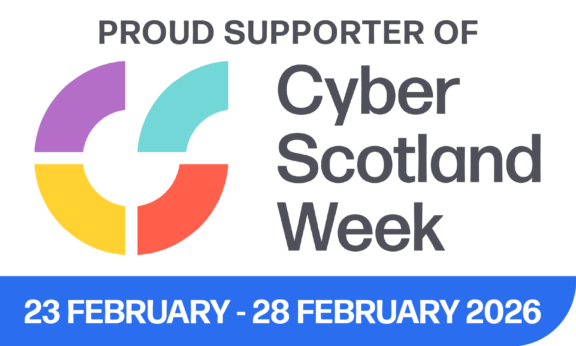
CyberScotland Week – Tips to Embed Cyber Resilience in Your Organisation
CyberScotland Week is back for its eighth year, running across Scotland from 23 – 28 February 2026. This national awareness campaign brings together groups to…
Scotland’s leading organisation for tackling cyber and fraud crime, Cyber and Fraud Centre – Scotland, is issuing a plea for additional funding to be allocated to fighting organised crime and building cyber resilience through a new collaborative multi-agency hub.
Results have revealed that over £3m of defrauded money was recovered or ceased in transfer during a six-month trial of the centre’s triage hub, and funding is now being sought to develop and expand the model into a fully sustainable charitable organisation.
The multi-agency triage hub trial was set up in May 2023 to bring cybersecurity partners, including Police Scotland, leading financial institutions like NatWest, Lloyds, Metro Bank and Cyber and Fraud Centre – Scotland’s incident response team, together to collaborate and share intelligence, disrupt large criminal gang activity, deliver support to victims and recover stolen funds.
Police Scotland receives around 18,000 fraud calls a year – with around 95% being cyber enabled and committed using an online device – demonstrating increasing demand for cybersecurity support as the threat of cyberattack and fraud persists for businesses.
Reported incidents of cybercrime in Scotland have doubled between 2019-2020 and 2022-2023, with Business Email Compromise (BEC) CEO impersonation and crypto and investment fraud making up the bulk of these crimes. The nature of cybercrime as an underreported crime means that these numbers are likely to be higher.
During its trial period, the hub worked on cases totalling almost £10 million of fraudulently obtained money by collaborating and liaising with high street banks including Barclays, NatWest, Lloyds, Metro and HSBC and gathering valuable intelligence on fraud attempts to help prevent cyberattacks from happening in the first place.
Organisations can find themselves vulnerable to cyberattack regardless of size, with smaller businesses, public organisations and charities equally vulnerable. The Orkney-based Rousay, Egilsay & Wyre Development Trust, for example, was targeted earlier this year and its story emphasises the importance of victim support for those who’ve experienced cyber and fraud crime. This crime was reported to Police Scotland and continues to be investigated by specialist officers.
Stuart Williams, Trust Manager at the Rousay, Egilsay & Wyre Development Trust, said: “Experiencing a cyberattack has a profound and long-lasting effect on people, and it’s important to receive the right support and guidance afterwards. Cyber criminals are skilled at deceiving their victims, and there needs to be a greater awareness of what they’re capable of. Our organisation was the victim of a targeted attack by criminals who knew exactly what to say to persuade us to part with important details, and we were defrauded to the tune of £120,000 as a result. The Cyber and Fraud Centre – Scotland signposted us towards crucial resources in the aftermath of the incident and gave us timely and informed advice about which steps to take next. Thankfully our outcome was a positive one and we received a full refund through our bank, but the personal impact on the team has been immense.”
Andy Freeburn, Assistant Chief Constable at Police Scotland, added: “Cybercrime and frauds are more sophisticated and have huge repercussions for victims, as we’ve seen from cases like Stuart’s, which remains under investigation. Police Scotland continues to develop the skills, training and equipment to respond effectively to cybercrime.
“Collaboration is the key to prevention, but also to develop the expert knowledge to investigate and importantly support people, businesses and the wider communities when the worst does happen.
“We know the figures do not represent the full extent of the issue and I would encourage any person or business who has become a victim of a cybercrime to report it to Police Scotland, the Cyber and Fraud Centre Scotland and their banks to ensure a full investigation and access the support which is available.”
Jude McCorry, CEO of Cyber and Fraud Centre – Scotland, said: “Cyber criminals are becoming increasingly sophisticated, and we really can’t afford to underestimate the impact of cybercrime and fraud – both financially, as cybercrime is estimated to cost the Scottish economy billions each year, and on a personal level too, as experiencing a cyberattack is a highly stressful event for business owners and their employees. With government organisations also at risk, cyberattacks pose a threat to our democracy and the integrity of governmental institutions.
“The startling results of our triage hub trial have demonstrated the need to dedicate resources to tackling cybercrime, and stories like Stuart’s reflect the huge positive impact that our work has had so far. We prioritise collaboration every step of the way, beginning by working with victims to report cybercrime and fraud and staying by their side throughout their journey, concluding by helping affected organisations to avoid future attacks. With further investment we can continue to deliver positive outcomes for businesses, at a time when being alert to cyber threats has never been more crucial. “